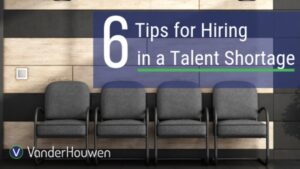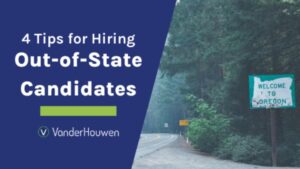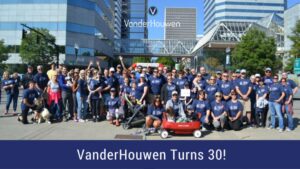What To Do When An Employer Doesn’t Call You Back
Does this scenario sound familiar? You find the perfect job at a great organization that aligns with your background and skill set. You can envision yourself growing with the company as you advance in your career. You spend time writing a cover letter and filling out the job application. And then… nothing. The employer or hiring manager doesn’t reach out to you about next steps—or worse they don’t even confirm that they have received your application.
So, what should you do when you don’t get a response after you have applied for a job? And, how can you improve on your next application to garner better results? We’ve outlined our top tips to set you up for success before you apply for a position, and what to do after you’ve submitted your application but haven’t heard back about a role.
Triple check for typos and grammar errors. Don’t let a resume with an accidental misspelling or extra punctuation cause your application to be dismissed. Before you click “submit,” thoroughly review your resume and cover letter to ensure your work is typo-free. A clear, succinct, and edited application demonstrates that you pay close attention to the details and will give the hiring manager confidence to move you forward in the application process. Ask a friend to review your resume and cover letter or try reading each sentence from the bottom of the page up to the top during your editing process—this approach can help you catch easily overlooked errors because it forces you to pay attention to each individual word.
Make sure your resume speaks to the position posted. It’s not uncommon for your resume to be sent to an HR recruiter who may not have in-depth knowledge of the role before making it to the hiring manager’s desk. Many large organizations are often fielding hundreds of applications for each job posting or leveraging Applicant Tracking Systems, which automate the intial vetting of candidates based on keyword matching between your resume and the skills needed for the job. Think of these recruiters and technologies as the gatekeepers: they are looking for candidates that can check-off boxes on a specific list of skills. Tailor your resume and cover letter to highlight the skills that are most relevant to the job you’re applying to while paying close attention to specific keywords or phrases being used in the job post description. Leverage language that’s similar to the job posting when showcasing your experiences.
Simplify your resume. Hiring managers are looking for easy-to-read resumes that are short and to the point. Remember that they may be reviewing dozens of resumes so it’s important to help them understand who you are and why you’re a good fit. Formatting is your friend when it comes to clear and concise messaging: use bolded headers and leverage bullet points to describe your professional experience. Include insights about what you’ve accomplished in your past roles so that when a hiring manager is done reading your resume, they have a clear picture of your skills and what you can bring to the table for their organization.
Don’t forget your social channels. It’s not uncommon for recruiters or hiring managers to want to learn about your interests and passions outside of work. Sometimes they’ll search beyond your resume and take a peek at your social channels. Get ahead of it by making sure your social accounts are appropriate and cast you in a positive light. Remember to be thoughtful about your accounts and consider that what you post might be viewed as a reflection of you. Start with LinkedIn—update your profile to match your resume and give the hiring manager a complete picture of what you do.
Tap into your connections. Utilize your network and ask for a referral. If you are targeting a specific company and you know someone that works there, see if they might be willing to give you an endorsement or pass your resume along to the right people at the organization. Take a look at the company on LinkedIn to see if you have any connections that are employed there. Write a thoughtful and to-the-point message outlining your request. If they agree to pass your information along, provide them with a short summary of your skills, experience, and what you bring to the table along with your resume so that they can easily customize their referral when corresponding with the hiring manager.
Reach out to a recruiter and get feedback. A recruiter can be your best friend during the hiring process. Working with both job seekers and hiring managers, recruiters often have one-of-a-kind insights that can help you tailor your outreach for future opportunities. If you’re working with a recruiter, don’t be afraid to reach out to ask for an update about where they are in the hiring process or for feedback as to why you were not moved forward. Follow up with a phone call or send a short, professional email. Use this opportunity to learn from their advice on what you could have done better.
Get out and network. When searching for a new position user groups and networking events are a great place to go to learn more about companies, try something new, and mingle with others in your field. Look for group meet-ups related to your position or networking events in your industry. It’s not uncommon for these types of events to be sprinkled with key hiring managers as well as leading recruiters looking to find new talent. Make a good impression and it may pay off down the line!
Keep your head up and move on to the next one! If it seems unlikely that you’re going to hear from your target organization or you’ve received confirmation that they have filled the role, it’s important to stay positive. Don’t give up! Keep applying to positions that are a good fit based on your experience. Just because you haven’t been contacted doesn’t mean you’re not right for the job. Take time to learn from each opportunity and refine your craft when it comes to communicating the skills you have in a way that is easy for the hiring manager to understand and see your potential.
Sometimes, searching for jobs can feel more like a marathon than a sprint. When it’s been weeks since you submitted your job application, it’s easy to think that you may be getting the silent treatment from your target organization. Instead of dwelling on why, make sure you are tailoring your resume, learning from your experiences, and staying positive as you go. We promise that in the long run, it will pay off!
So, what should you do when you don’t get a response after you have applied for a job? And, how can you improve on your next application to garner better results? We’ve outlined our top tips to set you up for success before you apply for a position, and what to do after you’ve submitted your application but haven’t heard back about a role.
Before submitting your application
The first step to landing a callback and interview is to “wow” the hiring manager from the get-go, starting with the application process. It’s essential to take advantage of every interaction you have with a brand, hiring manager, and/or recruiter. Make sure your application is in tip-top condition to make a lasting impression from the very beginning.Triple check for typos and grammar errors. Don’t let a resume with an accidental misspelling or extra punctuation cause your application to be dismissed. Before you click “submit,” thoroughly review your resume and cover letter to ensure your work is typo-free. A clear, succinct, and edited application demonstrates that you pay close attention to the details and will give the hiring manager confidence to move you forward in the application process. Ask a friend to review your resume and cover letter or try reading each sentence from the bottom of the page up to the top during your editing process—this approach can help you catch easily overlooked errors because it forces you to pay attention to each individual word.
Make sure your resume speaks to the position posted. It’s not uncommon for your resume to be sent to an HR recruiter who may not have in-depth knowledge of the role before making it to the hiring manager’s desk. Many large organizations are often fielding hundreds of applications for each job posting or leveraging Applicant Tracking Systems, which automate the intial vetting of candidates based on keyword matching between your resume and the skills needed for the job. Think of these recruiters and technologies as the gatekeepers: they are looking for candidates that can check-off boxes on a specific list of skills. Tailor your resume and cover letter to highlight the skills that are most relevant to the job you’re applying to while paying close attention to specific keywords or phrases being used in the job post description. Leverage language that’s similar to the job posting when showcasing your experiences.
Simplify your resume. Hiring managers are looking for easy-to-read resumes that are short and to the point. Remember that they may be reviewing dozens of resumes so it’s important to help them understand who you are and why you’re a good fit. Formatting is your friend when it comes to clear and concise messaging: use bolded headers and leverage bullet points to describe your professional experience. Include insights about what you’ve accomplished in your past roles so that when a hiring manager is done reading your resume, they have a clear picture of your skills and what you can bring to the table for their organization.
Don’t forget your social channels. It’s not uncommon for recruiters or hiring managers to want to learn about your interests and passions outside of work. Sometimes they’ll search beyond your resume and take a peek at your social channels. Get ahead of it by making sure your social accounts are appropriate and cast you in a positive light. Remember to be thoughtful about your accounts and consider that what you post might be viewed as a reflection of you. Start with LinkedIn—update your profile to match your resume and give the hiring manager a complete picture of what you do.
After submitting your application
It’s been weeks since you applied and you still haven’t heard back. Instead of heading into the corporate office or calling up the hiring manager to demand answers, take this as an opportunity to learn and grow. Whether it’s out of your control or something you can fix, use each job application process as another stepping stone to finding your perfect career.Tap into your connections. Utilize your network and ask for a referral. If you are targeting a specific company and you know someone that works there, see if they might be willing to give you an endorsement or pass your resume along to the right people at the organization. Take a look at the company on LinkedIn to see if you have any connections that are employed there. Write a thoughtful and to-the-point message outlining your request. If they agree to pass your information along, provide them with a short summary of your skills, experience, and what you bring to the table along with your resume so that they can easily customize their referral when corresponding with the hiring manager.
Reach out to a recruiter and get feedback. A recruiter can be your best friend during the hiring process. Working with both job seekers and hiring managers, recruiters often have one-of-a-kind insights that can help you tailor your outreach for future opportunities. If you’re working with a recruiter, don’t be afraid to reach out to ask for an update about where they are in the hiring process or for feedback as to why you were not moved forward. Follow up with a phone call or send a short, professional email. Use this opportunity to learn from their advice on what you could have done better.
Get out and network. When searching for a new position user groups and networking events are a great place to go to learn more about companies, try something new, and mingle with others in your field. Look for group meet-ups related to your position or networking events in your industry. It’s not uncommon for these types of events to be sprinkled with key hiring managers as well as leading recruiters looking to find new talent. Make a good impression and it may pay off down the line!
Keep your head up and move on to the next one! If it seems unlikely that you’re going to hear from your target organization or you’ve received confirmation that they have filled the role, it’s important to stay positive. Don’t give up! Keep applying to positions that are a good fit based on your experience. Just because you haven’t been contacted doesn’t mean you’re not right for the job. Take time to learn from each opportunity and refine your craft when it comes to communicating the skills you have in a way that is easy for the hiring manager to understand and see your potential.
Sometimes, searching for jobs can feel more like a marathon than a sprint. When it’s been weeks since you submitted your job application, it’s easy to think that you may be getting the silent treatment from your target organization. Instead of dwelling on why, make sure you are tailoring your resume, learning from your experiences, and staying positive as you go. We promise that in the long run, it will pay off!
Is your resume application ready? Check out VanderHouwen’s top resume recommendations.































































































































